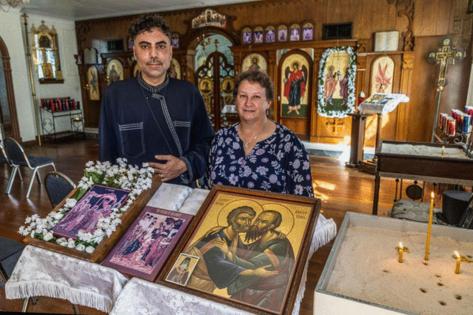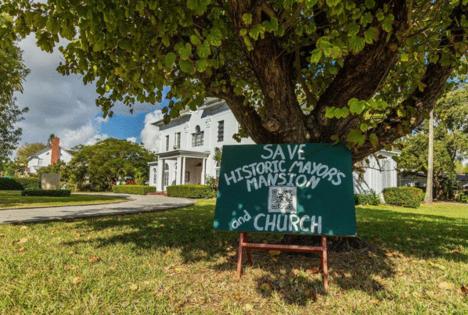Leaders of historic Miami Orthodox church must hand keys to Texas diocese, judge rules
Published in News & Features
MIAMI — After a lengthy and tangled dispute over ownership of one of South Florida’s oldest Christian Orthodox churches, its long-time leadership has lost a pivotal legal battle — and the keys to the sanctuary, at least for now.
Former leaders of the Saints Peter & Paul Russian Orthodox Greek Catholic Church, a 70-year-old congregation that was once a mansion belonging to Miami’s first mayor, have been ordered by a judge to vacate the property by Friday and open the doors to the Orthodox Church in America.
The ruling from Circuit Court Judge Lisa Walsh comes after a nearly three-year-long dispute that has led to dueling lawsuits, allegations of fraud and the excommunication of longtime parish leaders.
In an initial ruling in March, Walsh sided with the OCA, the largest of three Russian Orthodox ecclesiastical bodies in the United States. An appellate court later denied a request to stay her order from parish members fighting to keep the church independent from the Texas-based diocese. Then, late last month, Walsh set a June 6 deadline for the former parish leaders to leave the property and turn over any records, funds or property belonging to the parish.
Walsh’s ruling, which largely adopted proposed orders written by the OCA’s attorneys, found Florida law forbids civil courts from ruling in ecclesiastical decisions of an archbishop within a hierarchical church. The diocese praised the decision and has rejected allegations from congregation leaders of a “takeover” that potentially could lead to the sale of a historic property in an area undergoing upscale redevelopment.
“It was heartening to learn that the Circuit Court agreed with and ruled in favor of the Diocese of the South, which was not working to ‘take over’ the community of Sts. Peter and Paul, as has been incorrectly suggested, but rather to restore proper governance and oversight as established in our statutory documents and by canon law,” said Peter Robichau, the secretary of the diocese, in a statement.
But lawyers for Sts. Peter and Paul argued that the matter isn’t a religious dispute but more a question of real estate law and property ownership and the judge “improperly deferred to the Diocese’s self-characterizations” about the relationship between the parish and the Diocese.
“We believe the Court should have focused upon the church’s own internal documents, including those regarding the founding and historical practices of the church, when assessing what kind of relationship existed between the church and the Diocese,” said Marco Farah, the attorney representing Sts. Peter and Paul leaders, in an email to the Miami Herald. “We believe the Court’s ruling is incorrect.”
There is an ongoing appeal but, barring a reversal, the OCA is in control of the church corporation and the property.
The OCA argued, in the lawsuit, that its longstanding religious ties with Sts. Peter & Paul give its bishops broad authority to seize control of church property — even though public records show the parish nonprofit corporation has owned the building since the 1950s before the OCA existed. Parish leaders argued in the lawsuit that they have always managed the churches’ finances independently and have no financial or legal ties to the OCA.
“We were set up before they existed. We never accepted their bylaws, so that’s what we’re fighting for because that’s how we work,” said Susan Homyk, one of the parish members named in the lawsuit.
Legal experts told the Herald that such battles between Orthodox denominations highlight a gray area in American law between the constitutional separation of church and state but judges tend to defer to church authorities in many disputes.
For Homyk and her husband Randy, the loss is especially personal. Both have long been active members and served on the elected parish governing council, volunteered and donated many personal items to the church.
They say they have contributed thousands of dollars from their own pockets to help sustain the small parish and recruit a new priest from Ukraine. That last effort appears to have sparked the conflict with the OCA after years of friendly if — according to the Homyks and Deacon Georgios Zervos at least — arm’s-length relations with a diocese based 1,300 miles away in Dallas.
Alleging disobedience, among other claimed doctrinal infractions, the OCA excommunicated the Homyks and longtime parish council leader Priscilla Rivera. Zervos, the trio’s ally, was suspended as a Russian Orthodox deacon (he says he now has the blessing of the Greek Orthodox denomination). The dispute has divided the congregation, which has been left without a priest and lost much of its already small membership.
Representatives for the Diocese of the South, a branch of the Orthodox Church in America, said that the former parish council leaders are no longer a part of the church — a fact that has now been recognized by the courts.
“The Homyks and Ms. Rivera are not Parish leaders, and as the Court recognized, they have not been part of the Parish for approximately two years,” representatives for the OCA wrote in an email to the Miami Herald.
As for the future of the parish, the OCA said it hopes “to make services available to all who wish to worship under the Parish’s proper leadership in good faith ....”
Former Sts. Peter and Paul leaders have said, publicly and privately, that they feared that the OCA might sell the property, which has significant historic value, citing potential financial hardships within the dioceses. But OCA leaders have also said repeatedly that they wish to restore the church as an active place of worship.
“It is also discouraging that those improperly claiming to be the leaders of Sts. Peter and Paul Orthodox Church have continued to wrongly assert that the events that have taken place happened because the Diocese of the South desired to sell and profit from the sale of the property in Little Havana. As noted before, both in the court record and to the Miami Herald, this is plainly untrue,” Robichau said in a statement.
“The Diocese of the South cannot and will not sell the property for its profit because it belongs to and exists for the faithful members of Sts. Peter and Paul Orthodox Church, a Parish of the OCA and Diocese,” he said.
©2025 Miami Herald. Visit at miamiherald.com. Distributed by Tribune Content Agency, LLC.










Comments